Massachusetts Board of Higher Education Woes
Attacking State Colleges is Class Warfare!
Updated November
2,
2008

Show your support
March
31 to April 4!
Ask Gov. Patrick
to step up!
|
Attacking
students and faculty is also a bipartisan sport in Massachusetts. The
rhetorical attacks have diminished with the current administration, but
faculty members and librarians are still not respected on pay day or in
bargaining. Our new governor promises
something different.
We call upon him to put serious actions
behind his kind words.
Why the public should care: Students suffer
when faculty members are demoralized and disrespected. Many of my most
talented colleagues have already left this system and, quite frankly,
many more are considering it. This takes place whle student fees
increase far faster than the salaries of those who serve them.
To learn more about how this affects students and the general public,
see my 2005 State House speech to
students and my 2004 letter to students.
|
YOU CAN HELP: If you have a higher
education web site, please consider providing a link to this page. The
link will be more effective if you also explain why
these issues are important to you and your site visitors. THANKS!
UPDATED July 10, 2007
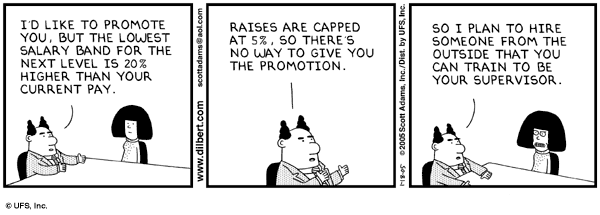
From
the Dilbert
Archive . Permission pending.
The cartoon
above describes the situation of many professors at Bridgewater
State College. Many senior professors and librarians earn receive the
same salaries as minimally-qualified new professors and librarians --
sometimes even less. This problem is well-understood, but nobody has
tried to fix it yet. (The only
difference from the Dilbert strip is that our
raises were capped at ZERO for more than two years. With
increasing contribution
to health-care premiums, we were getting NEGATIVE raises in 2004 and
2005.) This is
why
I once applied for a
demotion to Assistant Professor, in the hopes of earning a
higher salary.
|
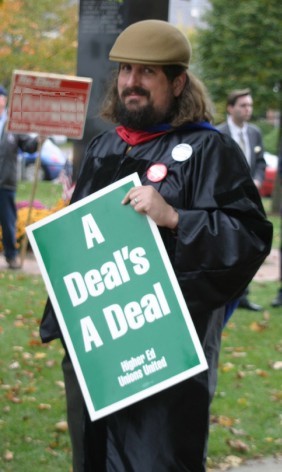
Photo courtesy of David Wilson
Maybe in Mississippi, but not here:
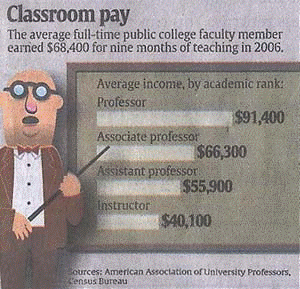
Source: USA Today Graphic, March 1, 2007
The graphic feeds public
misunderstanding of faculty pay. First, it implies that professors are
paid for the classes we teach. Classroom teaching is only about one
third to one half of the job. Continuing scholarship and
training, student mentoring, networking, and -- increasingly --
community service are part of what we do, and we spend all year doing
it!
Second, people in Massachusetts should know that professors at the
Associate and Full Professor rank do not make anything close to the
national average salaries, even though we live in one of the most
expensive areas of the country! We are not even close to these figures,
which are now two years old.
|
REGARDING
THE PHOTO ABOVE: On October 26, 2004, Gov. Mitt
Romney
planned to attend a political event in Bridgewater. When state college
faculty,
staff, administrators, and students heard about this, we made plans to
attend.
At the last minute, Gov. Romney changed his plans, ostensibly to attend
a
funeral. I hope that he finds another opportunity to visit Bridgewater
and
meet some of the people -- students, staff, and faculty -- whose lives
are
so profoundly affected by his policies on higher education.
Lacking a governor, we decided to let passersby know about our
important cause. |
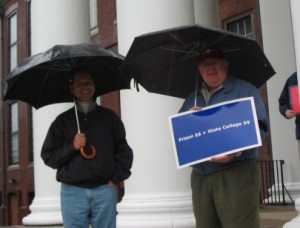
If you want support from the Commonwealth, you are better off in prison
than at a state college! (Sign reads: Prison $$ > State College $$)
|
SEPTEMBER
29, 2004
DAY OF OUTRAGE
Loyal
employees underpaid!
Two years with no faculty/librarian contract!
Governor
vetoes funding contract for other employees!
Legislature does nothing!
Students pay more!
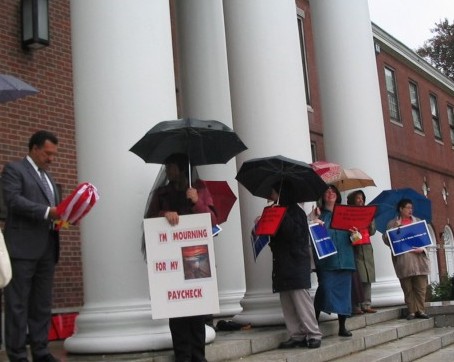
President Mohler-Faria joined faculty and librarians, as we stood in
the rain and ask students and colleagues to contact Gov. Romney.
|
Massachusetts is the only state I have
lived in where public higher education is considered somehow inferior.
(Strangely, even some colleagues on the faculty look down on state
colleges; they are guilty of malpractice.) In most states,
many political, educational, and business leaders are graduates of
state colleges and
universities.
It is only in Massachusetts that such leaders come mainly from private
schools and therefore perpetuate an inferiority complex among those
associated
with
state colleges.
The efforts to undermine public higher
education in Massachusetts are ongoing, severe, and bipartisan. Neither
political party in Massachusetts can be counted on to support publich
higher education. Faculty, staff, students, and alumni must constantly
remind politicians of both parties of the value and importance
of our state colleges, universities, and community colleges.
Gov. Romney's budget and
reorganization proposals -- if implemented -- would take the attacks on
public higher education in Massachusetts to a new level. Faculty and
staff -- already severely underpaid -- would face pay decreases
, non-academic political appointees would take over governence, and
some
campuses would become private companies. This is a direct attack on
working-class people seeking higher education in Massachusetts. Gov.
Romney does not want working people to have access to the quality
education currently available at Bridgewater State College and other
Massachusetts state colleges.
For more information, please see:
- Bush's
Lump of Coal for Students - from the Chicago Tribune on
December 29, 2004
- Liberal
State, Libertarian Policies explains the connections among
our education woes, libertarian politics, and WalMart
- My September 2004 letter to Senator
Pacheco
- My November 10,
2004 letter to Governor Mitt
Romney
- My letter to student leaders
at Bridgewater State College, explaining how this conflict involves
students
- Boston Herald editorial
about a pay increase for state college presidents
- My note to Sen. Kerry , in response
to his higher-education proposal
- "State
college presidents take their case to Gov. Romney ," from the
Bridgewater State College web site
- Massachusetts State
College Association , the organization of professors and librarians
at the state colleges; see especially the letter to Chancellor Gill and
the Messages to the Membership
- November 21, 2004, President of Worcester State
College elaborates on the state college underpaid faculty issue.
The challenges to public higher education in Massachusetts
include:
- Massachusetts ranks 50th - that is not a typo - in the
nation in per-capita funding of higher education.
- The legislature hastily passed an early retirement law that may
cause some programs to shrink or be closed if they are staffed by
eligible
professors.
- A few years ago, library budgets were cut by 85 percent (again,
not a typo) system-wide. This means that many journals are being
eliminated, and
some libraries in the system could lose accreditation.
- Massachusetts state college faculty remain the lowest paid in
the Northeast.
- Massachusetts state college and university administrators and
support staff a contract, but the acting governor and legislature have
refused to provide funding for it.
- State budget cuts (thanks in part to the acting governor's tax
rollback) have resulted in student fee increases of more than $1,000.
-
 In
Massachusetts, the average worker with an Associate's degree earns
$42,000, which is close to the median salary of a state college
professor with a Ph.D. and several years experience. This reflects well
on the value of a public higher education in Massachusetts for those on
the receiving end, but it belies
the lack of importance the Commonwealth places on rewarding those who
provide
that education. Very few state college professors earn as much
as
$60,000 per year, though many in administration earn more than double
this
amount. (See my letter to Chancellor Gill about
this issue.)
In
Massachusetts, the average worker with an Associate's degree earns
$42,000, which is close to the median salary of a state college
professor with a Ph.D. and several years experience. This reflects well
on the value of a public higher education in Massachusetts for those on
the receiving end, but it belies
the lack of importance the Commonwealth places on rewarding those who
provide
that education. Very few state college professors earn as much
as
$60,000 per year, though many in administration earn more than double
this
amount. (See my letter to Chancellor Gill about
this issue.)
- State colleges were treated poorly during the terrific economy
of the 1990s. The current recession may serve as an excuse to make the
punishment even worse.
- Lack of available money cannot be accepted as an excuse. Between
1998 and 2001, Bridgewater State College increased the number of top
administrators from 46 to 64 (including 6 new positions with "vice
president" or "assistant to the president" in their titles). Many of
these receive more than $100,000 per year, and almost all of them earn
more than the average full professor. That is, even the lowest-paid
administrators tend to receive greater pay than
the highest-paid professors. I do not think that these people
are
overpaid. The fact that they are paid competitively, however, indicates
that
money is available for salaries that are deemed sufficiently important.
_________________________________________________________________________________
On December 5, 2001, fully six months after
the MSCA
ended three years of brutal and humiliating bargaining with a hostile
Board
of Higher Education, the Massachusetts legislature deigned to fund the
agreement.
They were not heros for doing this, and they should be held accountable
for
their foot-dragging. For now we can celebrate this: state college
faculty
in Massachusetts are only 20 percent underpaid now, rather than 30
percent!
Thanksgiving
2001 Cuts:
The Massachusetts legislature continued to
savage the state colleges, announcing a $50,000,000 cut in higher
education in the same week that $5,000,000 was given to the gambling
industry. (See my letter on the
subject, published by the Brockton Enterprise.)
You can be assured that the education cuts
will fall
disproportionately on state college faculty, librarians, and library
acquisitions.
It does not appear likely to diminish executive pay, as state college
deans,
VPs, and presidents continue to draw upwards of $100,000 per year.
Even the legislators who are "on our side"
should be ashamed of themselves for allowing the state budget fiasco to
continue. When the faculty was negotiating with the Board of Higher
Education, my local senator told me that he could not influence the
BHE. Now that the contract has been in the legislature's hands for six
months, it is clear he is not willing to exercise any influence there,
either.
Long-time residents have been urging me to
adjust to the undemocratic way of life in Massachusetts. I refuse to do
that. If democracy can be brought to the Soviet Union, El Salvador, and
South Africa, surely it can return to the hearth of American democracy.
This will only occur,
however, if citizens urge their legislators to push for rules that will
dilute
the power of Beacon Hill "leaders."
 |
$8,333 *
per credit hour |
Acting Gov.
Jane Swift
Suffolk University
Academic Qualifications
B.A., Trinity
College 1987 |
|
$1,734 *
per credit hour
($894 for evenings)
|
|
|
Dr.
James
Hayes-Bohanan
Bridgewater State College
Academic Qualifications
B.A.,
University of Maryland 1986
M.A., Miami
University 1989
Ph.D.,
University of Arizona 1998
Teaching for
14 years
|
|
On May 4, 2001
(my birthday), the results of MSCA's ratification vote were announced.
The membership accepted a new contract.
|
| This ongoing debacle of the past three
years would not continue if faculty had the right to strike. Faculty
who
strike can be fired without any due process -- further evidence that
Massachusetts is not the liberal bastion it is often assumed to be. The
prohibition against striking suggests that faculty perform a vital
public service -- comparable to fire or police protection -- that
cannot be interrupted. The Commonwealth cannot have it both ways:
either we are vital and should be paid accordingly, or we are in
another category, to which normal labor laws should apply. Now that the
contract has been settled, it is time to turn our attention to the
right to strike. |
| Why students and alumni should care
: In her planning document, A Vision for Bridgewater, President Tinsley
addresses the
importance of fairer treatment for faculty . |
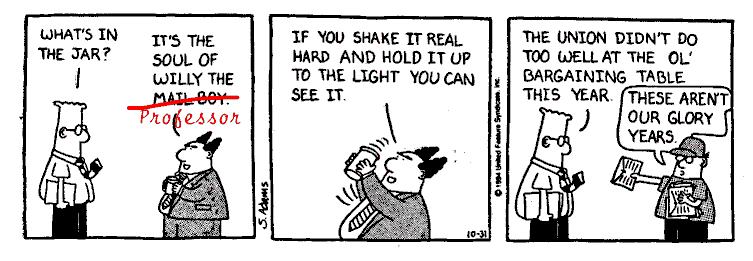
Permission from Mr. Scott
Adams has been sought and is pending.
Please visit www.dilbert.com for
unadulterated Dilbert cartoons.
According to
the U.S. Census Bureau, Massachusetts now ranks 43rd among the 50
states
in per capita spending on education, and 50th -- dead last -- in per
capita
spending on higher education.
from Sourcebook
2000 , a supplement to Governing: The Magazine of States and
Localities |
 |
On November 16,
1999, the Board of Higher Education, including its new chair, Mr.
Steve Tocco , arrived at Bridgewater State College for a routine
meeting. I was one
of 200 professors from throughout Massachusetts who were on hand to let
Mr. Tocco know how important a fair teaching contract is to our
students and to
the Commonwealth.
Several of us
also
participated in a presentation of the cutting-edge teaching
technologies
being used at the college.
|
|
ATTACKING STATE COLLEGES IS CLASS WARFARE
|
| QUESTION 4: My offer to
help!
After convincing the voters to roll back
a portion of the state income tax, Gov. Cellucci asked state
employees to identify ways to cut back on spending. Otherwise, he
implied, he will be
forced to break his promise to protect social services from budget
cuts.
My suggestion: Pay all executives in
state government (from the governor down to college deans) in
proportion to what professors make. If pursued ruthlessly enough, this
20 to 30 percent reduction would offset the tax rollback.
Of course, I am not serious. No
responsible person would try to improve an organization by cutting the
pay of its crucial employees -- unless, of course, that person is
actually trying to cripple the organization.
(I passed this idea along to the governor on December 15,
2000. I eventually recieved a reply from the Office of Administration
& Finance, informing me that pay was set by mutual agreement in
collective bargaining. The writer ignored the fact that without the
right to strike faculty were at the mercy of a bargaining team that is
appointed by the governor and which includes people who are
philosophically committed to the destruction of public education.)
|
Why do we do
this?
The situation has become so bleak that some
are starting to ask professors, in effect: "If you are so smart,
why can't you get a better job than this?" Imagine people anywhere
else thinking of professorhood as a foolish career move!
Each of us has to find his or her own
answer. Mine is that the work itself is rewarding: I spent many years preparing myself for exactly
the position I have now, and I continue to work hard to do it well.
- I like the emphasis placed on teaching in state colleges.
- I like that I receive support for a moderate but rewarding
research agenda.
- I like the fact that many of my classes are small enough to
allow real interaction with my students.
- I like watching students leave here to go on to successful
careers.
- I like the fact that the college supports the work faculty
do in the community .
- Just about the only thing I don't like is the
treatment afforded
faculty by the governor, the legislature, and the Board of Higher
Education,
all of which continue to punish us for our loyalty!
- Finally, I stay in the
position because I refuse to believe that the good people of
Massachusetts will reward politicians who
continue to punish the state colleges. I know that I will never get
rich in
this position, but I am confident that I will eventually be paid fairly
for
what I do.
We would not be fighting so hard if we
did not value what we do at the state colleges. We could easily walk
away for twice the money. |
To learn more, visit:
- At the City University of New York,
faculty have been more successful than we have in forging alliances
with students to demand better treatment. The faculty need for a
contract and student frustration with fee increases and aid cuts (sound
familiar?) led to a December 5, 2001 protest at CUNY
- Massachusetts State College Association includes
information about the controversial (but, sadly, necessary)
advertisement in the Chronicle of Higher Education.
- MSCA Bridgewater
Chapter provides some of the same information as the state-wide
site, but with
more links to independent web sites, local events, and steps
individuals
can take.
- Professor Richard Bisk's April 16, 2000 letter to the Boston Globe
- My April 17,
2000 letter to Gov. Cellucci
- Dr. John Kilbourne's Spring 2000 article about poverty-level
salaries, in the MSCA Perspective
- My August 29,
2000
letter to the Boston Globe, which addresses Lt. Gov.
Swift's appointment as "education czar"
- For a more positive perspective, see
Dr. Jeff Williams' October 17, 2000 letter
to the Boston Globe
- To find out just what a great value is
provided by our state college faculty, see the article "Hunt for
affordable
degree leads to a state college treasure," in the October 17, 2000 Christian
Science Monitor. Get it at your local library or download it for
$1.50 from the
Monitor Electronic Edition (This link will take you to a payment
page and then directly to the article. You will only be charged for
articles you actually read.)
- To prove that I can also be (somewhat)
positive about the Board of Higher Education when it is deserved, see
my November 6. 2000 letter to the
Brockton Enterprise
- Using national salaries and a regional
adjustment, Salary.com calculates that an average salary for an
assistant professor working in Bridgewater should be $56,772 (with a 25th percentile of $46k and a 75th percentile
of $69k). In fact, however, salaries for assistant professors
average $39,000, according to a study conducted by our own
administration. The average worker -- across all sectors -- in
Massachusetts earns $40,960. At state colleges, a terminal degree does
not even bring one up to average!
- My November
17, 2000 letter to Gov. Cellucci's office, which I copied to Sen.
Pacheco. Perhaps coincidentally, the governor acted on my request about
a week later.
- The Case for
Public Higher Education , by my political science colleague, Dr.
Victor DeSantis. This appeared
in the December 2000 issue of the Southeastern Massachusetts Business
Journal.
- My December 6, 2000 update from the trenches in Salem!
- The Chronicle of Higher Education
recently published an article that was dismissive of the value of state
colleges nationwide. Read three rebuttals
from the December 15, 2000 issues - two of them from Massachusetts.
- On December 6, 2000, the ENTIRE
Massachusetts delegation to the U.S. Congress wrote a letter to Gov. Cellucci , urging him to intervene
on behalf of state colleges.
| Defending Public Higher
Education in Brazil
I spent part of the summer of 2000 at UNIR - the Federal
University of Rondônia, Brazil. Government officials in Brazil
are as hostile to
public higher education as are government officials in Massachusetts.
While
I was in Porto Velho, UNIR students decided they had had enough! They
shut
down the major highway in the region for about two hours.
|

Photo:
Folha de Rondônia June 1, 2000
|
| *
The earnings
comparison at the top of the page is based on Dr. Hayes-Bohanan's
annual
salary, divided by his total teaching load. (On March 1, 2002,
figure
was increased to reflect the first significant faculty raise in four
years.) His salary is typical of relatively new faculty in the
arts and
sciences; some earn even less. The salary includes payment for all
additional
services, such as student advising, research, and administrative
responsibilities.
When teaching an evening course, faculty earn about half of the normal
rate
($894 for Dr. Hayes-Bohanan). This evening rate is actually the most
appropriate to compare with the Lieutenant Governor's "earnings."
Lt. Gov. Swift's pay
rate
is based on published reports that she received $25,000 to teach a
3-credit
class at Suffolk University. The class was a seminar with only five
students
(normally classes of this size are not allowed at the state colleges,
as
they do not make enough money). Moreover, the course met for only half
a
semester, and Suffolk provided a "team teacher" to handle some of the
details
of running the course, such as grading papers. Needless to say, Lt.
Gov.
Swift has not advocated such generous payment terms for the professors
under
her administration. Although Lt. Gov. Swift never admitted any
impropriety,
Suffolk University eventually was embarrassed enough to cancel her
contract.
FOR MORE
COMPLETE INFORMATION ABOUT FACULTY PAY, SEE THE SALARY STUDY .
|
Back to Dr.
Hayes-Bohanan's Environmental Geography pages.











